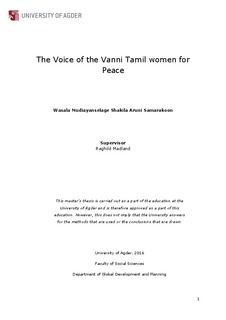| dc.contributor.author | Samarakoon, Wasala Mudiayanselage Shakila Aruni | |
| dc.date.accessioned | 2016-10-12T12:11:46Z | |
| dc.date.available | 2016-10-12T12:11:46Z | |
| dc.date.issued | 2016 | |
| dc.identifier.uri | http://hdl.handle.net/11250/2414622 | |
| dc.description | Master thesis development management - University of Agder 2016 | nb_NO |
| dc.description.abstract | The civil war in Sri Lanka came to an end in 2009, costing more than 40,000 civilian lives and resulting in major destruction of private and public property. At the end of the civil war the government of Sri Lanka promised peace through passing of amendments to the constitution, initiating reforms to institutions and ensuring human rights and freedom for civilians. The government’s promise of peace has become subject to the criticism of ethnic politics. While assuring peace through constitutional and institutional reforms and human rights and freedom for civilians, the government has promoted victors’ peace by celebrating the military victory over the LTTE and maintaining the military bases in the North and the Eastern regions.
The contemporary peace in Sri Lanka has been questioned in the research, examining the narratives of the Vanni women. This research aims to produce a new knowledge of feminist perspective on peace analysing a dualistic situation of the reality and the imagination of peace in the voice of Vanni women. In addition, the research is intended to understand the gender lines in the feminist discourse of peace. How has peace been perceived by the war affected Vanni Tamil women in Sri Lanka after 2009? What are the constraints on peace in the narratives of the Vanni Tamil women?
The research has collected primary data in the villages Mullativu and Killinochchi in the area called the Vanni area. The empirical data has been collected fromthirty-nine Vanni Tamil women, four civil organizations in Kilinochchi and one in Jaffna, five Tamil intellectuals in Jaffna. Additionally empirical data has been collected through four focus group discussions. Semi-structured interview guidelines have been used when conducting interviews. The research is based on qualitative data and the narrative analysis has been utilized in constructing the argument synthesizing empirical and theoretical data.
Key Words: Civil war, Feminism, Peace, Vanni Tamils and Violene | nb_NO |
| dc.language.iso | eng | nb_NO |
| dc.publisher | Universitetet i Agder ; University of Agder | nb_NO |
| dc.subject | civil war | nb_NO |
| dc.subject | feminism | nb_NO |
| dc.subject | peace | nb_NO |
| dc.subject | Vanni Tamils | nb_NO |
| dc.subject | violence | nb_NO |
| dc.subject.classification | UT503 | |
| dc.title | The Voice of the Vanni Tamil women for Peace | nb_NO |
| dc.type | Master thesis | nb_NO |
| dc.subject.nsi | VDP::Social science: 200::Women's and gender studies: 370 | nb_NO |
| dc.subject.nsi | VDP::Social science: 200::Political science and organizational theory: 240 | nb_NO |
| dc.source.pagenumber | 125 s. | nb_NO |
